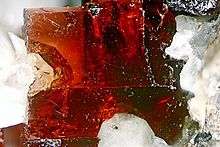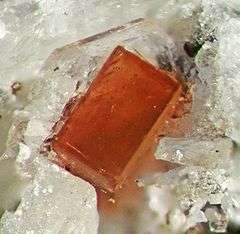Villiaumite
| Villiaumite | |
|---|---|
|
Small perfect crystal - Locality: Poudrette quarry, Mont Saint-Hilaire, Québec, Canada - field of view 1.4 x 1.4 mm | |
| General | |
| Category | Halide mineral |
| Formula (repeating unit) | NaF |
| Strunz classification | 3.AA.20 |
| Crystal system | Cubic |
| Crystal class |
Hexoctahedral (m3m) H-M symbol: (4/m 3 2/m) |
| Space group | Fd3m |
| Unit cell | a = 4.63 Å; Z = 4 |
| Identification | |
| Color | Carmine-red, lavender-pink to light orange |
| Crystal habit | Cubic crystals rare, commonly granular, massive |
| Cleavage | {001}, perfect |
| Tenacity | Brittle |
| Mohs scale hardness | 2 - 2.5 |
| Luster | Vitreous |
| Streak | White |
| Diaphaneity | Transparent |
| Specific gravity | 2.79 |
| Optical properties | Isotropic; weak anomalous anisotropism, then uniaxial (–) |
| Refractive index | n = 1.327–1.328 |
| Pleochroism | Strong E = yellow; O = pink to deep carmine |
| Ultraviolet fluorescence | dark red to orange and yellow fluorescence under SW and LW UV |
| Solubility | Soluble in water |
| References | [1][2][3] |
Villiaumite is a rare halide mineral composed of sodium fluoride, NaF. It is very soluble in water and some specimens fluoresce under long and short wave ultraviolet light. It has a Mohs hardness of 2.5 and is usually red, pink, or orange in color. It is toxic to humans.[2]
The red color is due to a broad absorption peaking at 512 nm. It is a result of radiation damage to the crystal.[4]
Occurrence

It occurs in nepheline syenite intrusives and in nepheline syenite pegmatites. It occurs associated with aegirine, sodalite, nepheline, neptunite, lamprophyllite, pectolite, serandite, eudialyte, ussingite, chkalovite and zeolites.[1] It has been reported from Minas Gerais, Brazil; Mont Saint-Hilaire, Quebec, Canada; the Ilimaussaq complex of Greenland; Lake Magadi, Kenya; Windhoek District, Namibia; the Fen Complex, Telemark, Norway; the Khibiny and Lovozero Massifs, Kola Peninsula, Russia; Porphyry Mountain, Boulder County, Colorado and Point of Rocks Mesa, Colfax County, New Mexico, US.[2]
It was first described in 1908 for an occurrence in Los Islands, Guinea and named after the French explorer, Maxime Villiaume.[2]
See also
References
- 1 2 Handbook of Mineralogy
- 1 2 3 4 Mindat.org
- ↑ Webmineral
- ↑ "Villiaumite Visible Spectra (350 - 1050 nm)". Retrieved 29 May 2013.
| Wikimedia Commons has media related to Villiaumite. |
